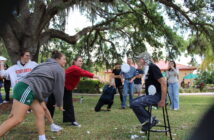
Due to a lack of increasing students or groups making choices and transforming those choices into actions, the Multicultural and International Student Services, in conjunction with Sunrise of Pasco County, Inc. and Counseling Services, organized a presentation on empowerment as a way of educating the students in violent situations.
The presentation took place on Mar. 9 at 6pm – 8pm in Selby Auditorium in which Amanda Markiewicz and Aubrey Hall, staff of Sunrise of Pasco County, were the main presenters. Both agreed that the purpose of this presentation is for students to feel self-caring, and self-esteem.
Other presenters were Jami Ray, a senior psychology major, and Tiffany Nelson, prevention counselor of Saint Leo University.
The presentation commenced with Hall asking questions of what the audience believes Sunrise does.
In response, Ray and Hall expanded on the responsibilities, functions, and resources Sunrise provides.
“Sunrise provides shelter, works with children and works to better women,” Ray said
“We do not just provide shelter, we have an outreach which deals with counseling; our jobs are intervention and prevention. But we are here to talk about prevention after which comes empowerment so that you realized how to empower yourself, and empowerment thereby prevent violence from happening,” said Hall.
Hall posits another question to the students present: “What does empowerment mean to you? Name a time you felt empowered.”
“For me,” said Ray, “Empowerment is being confident in yourself when somebody gets you and being sure of yourself. I feel confidence when I am performing. Like today, I will be [giving a]presentation.”
“Empowerment is being independent, especially in doing your business and the best way to empower others is through technological means, where we not only reach out to a person but we have a lot of social media where you can post a lot of empowering things to other people,” said Mary Kay, a hospitality major
Hall emphasized that there are other things she thinks about when she hears of empowerment, like working together, protesting, and equality of men and women. The opposite of empowerment and one of the ways to bring someone down is shaming.
Hall asked, “What is shaming? Do you see it on campus?”
“Just other females hearing other females making comments about other females, hearing it under the breathe makes it shaming,” Nelson said.
Hall pointed out that, we are culturally worried. What is important is that when people shame each other they are perpetuating the belief that some people deserve certain things. If someone don’t dress well and something happens to him or her, then he or she deserved what happened. If someone hangs out with certain people or someone is with certain types of people, something may happen and others will say that he or she deserved it. It is like cause and effect, but everyone knows that is not how life works because there are agencies that look out for women.
Therefore, when people think about cause and effect in concern to women, what they are really describing is rape culture.
“Rape culture is basically an idea that the societies perpetuate the existence of rape; it means that rape is not condemned,” Hall said.
One or two women may be sexually assaulted in their lifetime. Surprisingly, Hall asks if anyone knows a rapist. No answer was given.
“People probably know someone, but the problem is people don’t care about knowing that person,” said Hall.
“A research originally done in the 70’s, and replicated in a huge campus, shows that 25 hundred men on campus, could have sex with a woman even if she didn’t want it and still live with it. Eight percent said yes because the word “rape” was not in there. But what did I describe? I described rape or sexual assault,” Hall, in her presentation, said.
It is believed if people do certain things rape can be prevented from happening to them.
Hall asked, “What are you doing [on a]daily basis to prevent yourself [from being]raped?”
One of the guys at the presentation jokingly said, “I wanna be raped.”
Another guy said, “[I don’t] think about it.”
“Rape can be prevented to a certain extent. For instance, if you go to party, never drink with a stranger and always walk with someone in [an isolated]place,” said Kay.
Hall concluded her presentation by saying that sexual assault or rape happens when consent is not given.
Markiewicz, a core presenter, described consent as the ability to say yes in a certain situation and when it is not given in terms of sex, it results in sexual assault or rape. Consent is something that can change at any time, and people can say yes or no when someone wants to get their consent.
In the presentation, Markiewicz used a video of drinking tea to describe consent.
“Just imagine in a certain situation, you are making a cup of tea. You said, ‘Hey, would you like a cup of tea?’ ‘Oh my God, that will be lovely.’ Then you will know that they want a cup of tea,” said Markiewicz.
“But if the person answered, ‘No I can’t,’ or ‘Not really sure.’ But you make a cup of tea knowing that she might not drink it. If she doesn’t drink it, (this is the important part of it) don’t make her drink it just because you made her tea. [It doesn’t] mean that she must drink it,” said Markiewicz. If she says ‘No, thank you,’ then do not make her drink tea or do not make tea and get angry.”
“She might say ‘Yes, please,’ but when the tea arrives she actually does not want the tea anymore. This is another annoying part. If after making tea, she does not drink it, she is not in any obligation to drink the tea,” said Markiewicz
Markiewicz reiterated that everyone has a choice, and everyone needs to understand and be respectful of a person’s choice. Forcing someone to do something he or she doesn’t want to do, or is not in the right state of mind to consent to, is wrong.
“Some people change their minds and that is okay because they may have been unconscious when they gave their original answer. So don’t make them drink the tea and don’t ask them why they did not drink the tea, even if they took tea in your house the last time. Don’t force them to have tea. That is how to understand it when it comes to sex. Whether tea or sex, consent is everything,” said Markiewicz.
At one point during the event, Ray came up with her presentation. She presented on the celebration of being a woman. Women being on fire, being ambitious and confident in their selves.
“Women should not let any imperfections within them bring them down because they are born beautiful, they are born intelligent, and women should be perfect in their imperfections” said Ray.
It is on this note that Hall said, “Women are born great and should remove shame in their life.”
Kay added, “Shaming can result in gossiping, that women can sometimes stay together and gossip than talking about positive things. Like if someone looks nice, you can tell her.”
Before the conclusion of the event, Nelson gave a presentation on self-care. Caring for yourself in order to empower others in a violent situation.
“The idea is if you take care of yourself, you will be able to help others,” said Nelson.
Nelson pointed out that it is important to listen to one’s inner responses, one’s internal dialogue about self-care and making one’s self a priority. Take particular note of anything one would like to include more in one’s life.
According to Nelson, there are various ways of self-caring: Physical self –care, such as eating regularly, eating healthily, exercise, getting regular medical care for prevention, and other things that will help one physically.
Psychological self-care, like taking day trips or mini-vacations, making time away from telephones, email and the internet, writing in a journal, doing something at which one is not an expert or in charge of, and making time for self –reflection.
Emotional self –care, such as spending time with others whose company one enjoys, staying in contact with important people in one’s life, loving one’s self, allowing one’s self to cry, and finding things that makes one laugh.
Spiritual self –care, like making time for reflection, spending time in nature, meditating, praying, singing, having an experience of awe, contributing to causes in which one believes, reading inspirational literature, or listening to inspirational talks and music.
Relationship self-care, like scheduling regular dates with one’s partner or spouse, making time to see friends, calling to check on or see one’s relatives, allowing others to do things for one, and staying in contact with faraway friends.
Workplace or professional self –care, like taking time to chat with co-workers, making quiet time to complete tasks, setting limits with clients and colleagues, having a peer support group, getting regular supervision or consultation, and taking a break during the workday.
“All [of]these self-caring methods, if cultivated in [one’s] life, should help one to empower him/herself and also be able to empower others,” Nelson said.
In concluding the presentation, Hall said that one has to realize that one person can change things and make it better. She encouraged the students that they can change Saint Leo, thereby helping others to come out from the shadow of an inferiority complex and deal with any situations they find themselves, especially in violent situations.




